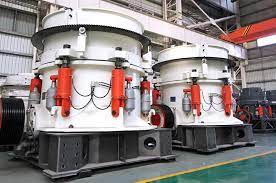The history of the construction industry is as old as human civilization itself. Over millennia, our ancestors developed techniques to shape raw materials to create tools, homes, and structures that would stand the test of time. Among these materials, rocks and stones have been of primary importance, serving as the very bedrock of many great infrastructures. But how do we transform these rocks from their natural state into the refined materials that are easier to handle and use? Enter the rock crusher for sale, a pivotal invention in construction history. This article will journey through the evolution of rock crushers, highlighting their impact on the construction industry.
The Humble Beginnings: Raw Stone Use
Before the advent of sophisticated machinery, early humans used raw stones for various purposes. These were:
- Tools for hunting and daily activities.
- As a foundational material for basic shelters and structures.
- For creating artworks and symbols of cultural importance.
However, the limitations of using raw, unprocessed stones became increasingly evident as the demands of society grew. There was a dire need to process and refine these raw materials, giving birth to the early rock crushing techniques.
Birth of the Rock Crusher
In the early days, rock crushing was a labor-intensive process, involving hammers and manual effort. Over time, as the demand for refined rock materials grew, so did the need for efficient rock crushing methods.
Evolutionary Milestones:
- Hand Operated Devices: These were basic contraptions where rocks were placed between two hard surfaces and pressure was applied to break the rock.
- Water-powered Stamp Mills: Used mainly in the mining industry during the 19th century, these machines utilized heavy metal stamps to crush rocks.
- Gyratory Crushers: Introduced in the late 19th century, these machines utilized a spinning motion to compress rocks against a stationary plate, breaking them into smaller pieces.
- Modern Rock Crushers: Today’s crushers use sophisticated technologies, incorporating hydraulics and electronics, to provide precise control over the crushing process.
Rock Crusher for Sale: Modern Market Dynamics
With the rise in infrastructure projects globally, the demand for refined rock materials has skyrocketed. This has led to a thriving market with various types of rock crushers for sale. The modern rock crusher market is characterized by:
- A variety of choices based on the specific needs of a project.
- Advanced technologies ensuring efficient rock processing.
- Environmentally conscious designs that minimize waste and pollution.
- Easily transportable designs for on-site crushing, reducing the need for transportation of raw materials.
Environmental Considerations
An often overlooked impact of rock crushers in the construction industry is their role in promoting sustainability. Here’s how:
- Waste Reduction: Modern crushers can recycle concrete and asphalt, turning construction waste into reusable materials.
- Resource Conservation: On-site crushing reduces the need to transport raw materials, leading to fuel savings and reduced carbon footprints.
- Ecosystem Protection: Reduced mining activities mean lesser disturbance to natural habitats.
Rock Crushers: The Unsung Heroes of the Construction Industry
The profound impact of rock crushers in the construction industry cannot be understated. They’ve transformed the way we handle and process raw materials, ensuring that our buildings, roads, and infrastructures are built on strong, refined foundations.
Key Contributions:
- BQuality Control: Rock crushers allow for uniformity in the size and quality of materials used in construction.
- Efficiency: With faster processing times, construction projects can be completed quicker.
- Cost Savings: On-site crushing can lead to significant savings in transportation and raw material costs.
Future Prospects
As we move forward, the role of rock crushers in the construction industry is set to evolve even further. With advancements in technology and a growing emphasis on sustainability, we can expect:
- Smarter Machines: AI-powered rock crushers that can adapt and optimize the crushing process in real-time.
- Greener Designs: Crushers that are more energy-efficient and have a reduced environmental impact.
- Integrated Systems: Crushers that can seamlessly integrate with other construction machinery, creating a cohesive workflow.
Conclusion
From the ancient use of raw stones to the sophisticated rock crushers we see today, the journey of rock processing in the construction industry has been nothing short of revolutionary. As we survey the modern construction landscape, filled with towering skyscrapers, expansive highways, and sprawling bridges, it’s essential to remember the unsung heroes behind the scenes – rock crushers. And for those in the industry, the myriad of rock crusher for sale options today signifies not just the demand but also the innovation that drives this sector forward.













